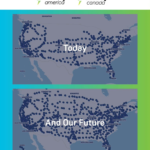A core fact for electric car owners, today, is that the charging station networks limit access to those who have a membership relationship with the appropriate network. It was a big advance to develop the J1772 standard, giving us a common standard to accessing charging services. But if we are prevented from using the charging stations through network membership requirements, we’re back to square one when there was multiple charging connector standards.
The ANSI EVSP Roadmap![]() identifies three gaps in charging station networks that describe this problem (see images below). In order to provide solutions two joint ventures have formed in recent months.
identifies three gaps in charging station networks that describe this problem (see images below). In order to provide solutions two joint ventures have formed in recent months.
The first – Collaboratev – is being formed between ChargePoint and ECOtality![]() , and is structured to hold the door open to other charging network operators to join.
, and is structured to hold the door open to other charging network operators to join.
The second – intercharge![]() – is being formed by a consortium of German comapnies,
– is being formed by a consortium of German comapnies,![]() also see Hubject GmbH home page
also see Hubject GmbH home page![]() .
.
In both cases, the service being offered is similar to the “roaming” system for cell phone or ATM use.
The idea is that the service, whether Collaboratev or Intercharge, sits in the background connecting charging network systems together. The driver approaches a charging station, and their authentication to use the charging station is facilitated by the charging station interconnection network or EVCIX.
In this model, charging stations are worked by Electric Vehicle Service Providers (EVSP), or what we might commonly call a charging station network. Today EVSP’s can only provide service to members of their network, or perhaps through credit card authentication if the EVSP provides that service.
What’s missing is connections between EVSP’s allowing a member of one EVSP to use facilities owned by another EVSP. The role of EVCIX companies is to provide those connections.
There are strong analogies with the ATM network operators and all the icons on the back of ATM cards. We have the freedom to use foreign ATM’s because certain companies sit in the background providing connectivity services between ATM network owners. These companies handle authentication and payments settlements.
EVCIX companies also handle authentication and payments settlements between EVSP’s.
Maybe it would be simpler if we could just use a credit card, like we do when driving a gasoline car. But there is a business problem with that – the credit card fees. For small charges like we’d incur at a charging station, credit card fees swamp the business model. Also the charging networks like to offer niceties such as charging status notification through cell phones, but if our authentication is anonymous through a credit card they cannot notify us that way.
- Highway design could decrease death and injury risk, if “we” chose smarter designs - March 28, 2015
- GM really did trademark “range anxiety”, only later to abandon that mark - March 25, 2015
- US Government releases new regulations on hydraulic fracturing, that some call “toothless” - March 20, 2015
- Tesla Motors magic pill to solve range anxiety doesn’t quite instill range confidence - March 19, 2015
- Update on Galena IL oil train – 21 cars involved, which were the supposedly safer CP1232 design - March 7, 2015
- Another oil bomb train – why are they shipping crude oil by train? – Symptoms of fossil fuel addiction - March 6, 2015
- Chevron relinquishes fracking in Romania, as part of broader pull-out from Eastern European fracking operations - February 22, 2015
- Answer anti- electric car articles with truth and pride – truth outshines all distortions - February 19, 2015
- Apple taking big risk on developing a car? Please, Apple, don’t go there! - February 16, 2015
- Toyota, Nissan, Honda working on Japanese fuel cell infrastructure for Japanese government - February 12, 2015


















